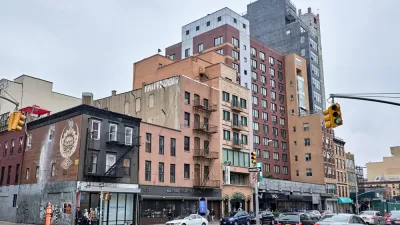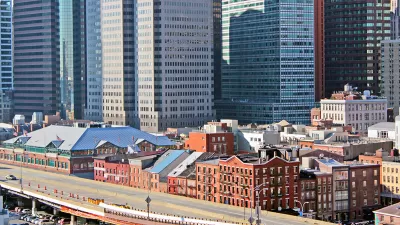Zoning can only be so effective in holding off market forces, according to this column. New York City seems to have finally learned this lesson in the Garment District, but will it inform decisions in other parts of the city?

Crain's New York Business columnist Greg David writes that New York City has fixed its "worst land-use mistake."
The decision in question dates to 1984, when political forces concerned about the potential for rising rents to drive businesses away resulted in manufacturing only zoning for side streets n the Garment District. "Apparel jobs vanished anyway—some 12,000 remain in the city and fewer than 5,000 in the Garment Center—in a telling example of how land-use policy is helpless in the face of economic forces," according to David.
"After almost two decades of trying, the city will finally end the restrictive zoning this fall," reports David.
According to David, the zoning changes reflect a city, and a planning regime, that has faced reality when it comes to manufacturing jobs, and the amount of space reserved for manufacturing uses around the city.
"In recent years, architects and design firms have swept in, along with tech companies and nonprofits—some in space restricted to manufacturers—bringing in a new, affluent workforce," writes David. "Even more transformational, the district is now home to 42 hotels, with 12 more under construction. Tourists have in turn lured restaurants and bars."
FULL STORY: Finally, a fix for the city's worst land-use mistake

Maui's Vacation Rental Debate Turns Ugly
Verbal attacks, misinformation campaigns and fistfights plague a high-stakes debate to convert thousands of vacation rentals into long-term housing.

Planetizen Federal Action Tracker
A weekly monitor of how Trump’s orders and actions are impacting planners and planning in America.

Chicago’s Ghost Rails
Just beneath the surface of the modern city lie the remnants of its expansive early 20th-century streetcar system.

Bend, Oregon Zoning Reforms Prioritize Small-Scale Housing
The city altered its zoning code to allow multi-family housing and eliminated parking mandates citywide.

Amtrak Cutting Jobs, Funding to High-Speed Rail
The agency plans to cut 10 percent of its workforce and has confirmed it will not fund new high-speed rail projects.

LA Denies Basic Services to Unhoused Residents
The city has repeatedly failed to respond to requests for trash pickup at encampment sites, and eliminated a program that provided mobile showers and toilets.
Urban Design for Planners 1: Software Tools
This six-course series explores essential urban design concepts using open source software and equips planners with the tools they need to participate fully in the urban design process.
Planning for Universal Design
Learn the tools for implementing Universal Design in planning regulations.
planning NEXT
Appalachian Highlands Housing Partners
Mpact (founded as Rail~Volution)
City of Camden Redevelopment Agency
City of Astoria
City of Portland
City of Laramie





























